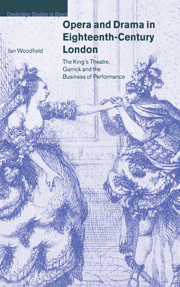 Opera and Drama in Eighteenth-Century London
Opera and Drama in Eighteenth-Century London Book contents
- Frontmatter
- Contents
- List of tables
- List of musical examples
- Acknowledgements
- A note on conventions
- Introduction
- 1 The Hobart management
- 2 The new managers take control
- 3 Sacchini and the revival of opera seria
- 4 Recruitment procedures and artistic policy
- 5 The King's Theatre in crisis
- 6 The recruitment of Lovattini
- 7 The English community in Rome
- 8 Lucrezia Agujari at the Pantheon
- 9 Caterina Gabrielli
- 10 Rauzzini's last season
- 11 The King's Theatre flourishes
- 12 The Queen of Quavers satire
- 13 Financial management
- 14 Opera salaries
- 15 The sale of 1778
- Appendices
- 1a The accounts of Richard Yates and James Brooke at Henry Hoare & Co. (1773–1777)
- 1b The customer account ledgers of Sheridan and Harris (1778–1779)
- 1c Selected entries from the account of Jonathan Garton at Drummonds Bank (1778–1779)
- 1d The account of Gasparo Pacchierotti at Coutts & Co. (1779–1784)
- 1e A page of opera payments and receipts in the Salt MSS (1780)
- 2a Petition to the Lord Chamberlain (c.1770)
- 2b Petition to the Lord Chamberlain (c.1775)
- 2c Draft petition to the Lord Chamberlain from Sheridan and Harris (1777)
- 3a Journal Etranger, No. 1 (June 1777)
- 3b Opera reviews from Journal Etranger (1777–1778)
- Notes
- Bibliography
- Index
2a - Petition to the Lord Chamberlain (c.1770)
Published online by Cambridge University Press: 22 September 2009
- Frontmatter
- Contents
- List of tables
- List of musical examples
- Acknowledgements
- A note on conventions
- Introduction
- 1 The Hobart management
- 2 The new managers take control
- 3 Sacchini and the revival of opera seria
- 4 Recruitment procedures and artistic policy
- 5 The King's Theatre in crisis
- 6 The recruitment of Lovattini
- 7 The English community in Rome
- 8 Lucrezia Agujari at the Pantheon
- 9 Caterina Gabrielli
- 10 Rauzzini's last season
- 11 The King's Theatre flourishes
- 12 The Queen of Quavers satire
- 13 Financial management
- 14 Opera salaries
- 15 The sale of 1778
- Appendices
- 1a The accounts of Richard Yates and James Brooke at Henry Hoare & Co. (1773–1777)
- 1b The customer account ledgers of Sheridan and Harris (1778–1779)
- 1c Selected entries from the account of Jonathan Garton at Drummonds Bank (1778–1779)
- 1d The account of Gasparo Pacchierotti at Coutts & Co. (1779–1784)
- 1e A page of opera payments and receipts in the Salt MSS (1780)
- 2a Petition to the Lord Chamberlain (c.1770)
- 2b Petition to the Lord Chamberlain (c.1775)
- 2c Draft petition to the Lord Chamberlain from Sheridan and Harris (1777)
- 3a Journal Etranger, No. 1 (June 1777)
- 3b Opera reviews from Journal Etranger (1777–1778)
- Notes
- Bibliography
- Index
Summary
Considerations on the State of the Stage
As an Act of Parliament passed in the Reign of His late Majesty restricting Theatrical performances, it is proposed to examine into the Cause, as &is not impossible it may be understood to have its rise from a presumption that the Number existing at that time was prejudicial to Society in general: but this was not the Case – for its affects are directly contrary, as can easily be proved from various instances & Reasons – but prior thereto it is fit to shew whence the restriction took its rise, – about the year 1738 a Theatre was opened in Goodmans feilds Wh for some time performed Theatrical Peices unmolested – their success encouraged a Broken Wit (says Cibber) to collect a 4th Compy in the Hay market; who soon finding the best Plays ill performed turned to a bad Accot, thought it necessary to give the Public some extraordinary peices, of such a Specie that no bad Acting coud Spoil; and that from their Nature, shoud, if not draw the attention of the Judicious, at least attract that of the Million (the Mob): under this distress he became Intrepidly abusive and licentious & in several Frank and free Farces, he pelted his Superiours and seemed to Aim at the destruction of every Idea of distinction in Mankind, both on the Heads of Religion, Governmt, Priests, Ministers & Judges; all were leveled by this Draw-cancer in Witt, who Spared neither Friend nor Foe till at last by his own Poetic Fire (like a second Erostratus) he consumed his own Stage, by writing up an Act of Parliament, for the purposes before recited – thus farr Cibber who wrote at the time the Act passed: but it was suspected that this Adventurer was hired to do this dirty business by the Patentees, who possibly were apprehensive if some Check was not given their Emolumts woud soon decrease.
- Type
- Chapter
- Information
- Opera and Drama in Eighteenth-Century LondonThe King's Theatre, Garrick and the Business of Performance, pp. 265 - 268Publisher: Cambridge University PressPrint publication year: 2001


